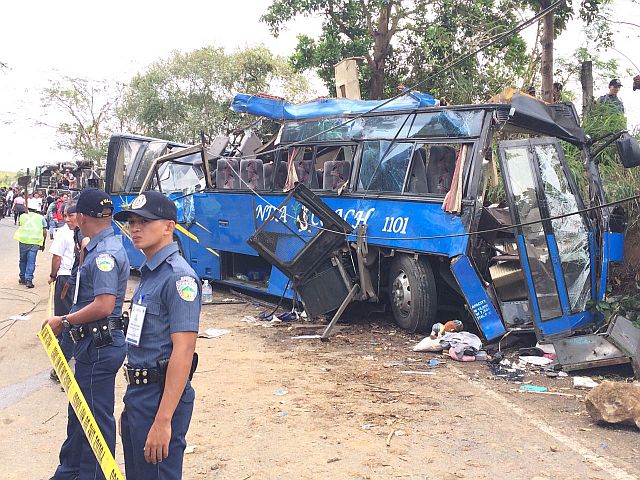
Police secure the accident area after the bus carrying students and teachers from Bestlink Colleges of the Philippines rammed a post in Tanay, Rizal. Fifteen people were killed in the accident last Monday. (INQUIRER PHOTO)
The students’ safety should be the priority of colleges and universities.
Cebu City Councilor Nendell Hanz Abella said this as he showed his support to the move of the Commission on Higher Education (CHEd) to impose a moratorium on field trips and educational tours in all higher education institutions (HEIs) in the country until the investigation on the Tanay bus accident would be completed.
“I support that move especially since there was an accident (in Tanay, Rizal). We don’t want that to happen here in Cebu City,” he told Cebu Daily News.
Accident, CHEd order
Abella was referring to the accident involving a tourist bus, carrying mostly students and teachers of Bestlink Colleges of the Philippines, which rammed a post in Tanay, Rizal last Monday, where 15 people were killed.
The CHEd’s commission en banc on Tuesday arrived at the decision on the moratorium on field trips following a proposal by Commissioner Prospero de Vera III to disallow field trips in private and public colleges and universities until completion of an investigation into the tragedy.
ABELLA
Memo signed
CHEd chairperson Patricia Licuanan signed a memorandum ordering all the presidents and officers-in-charge of state universities, colleges, private and public higher education institutions, CHEd central and regional directors to stop conducting field trips and similar physical activities.
“In lieu of field trips or external campus activities, all HEIs should institute replacement activities that will serve the purpose intended by such off-campus activities, preserve objectives sought to be achieved and see to it that no student shall be negatively affected by this moratorium,” Licuanan added.
Failure to comply with the memorandum, the commission will institute necessary actions against the HEI concerned.
Discourage field trips
Abella, for his part, said that field trips should be discouraged especially if these are not really integral or related to the students’ course or subject.
He pointed out that this had been the practice in most public schools in the city in order to also avoid additional expenses.
Abella is also the chairman of the committee on education of the Cebu City Council.
In some cases, field trips are just made in the guise of educational purposes when it is just for fun.
He said though that only educational tours that would really be helpful for students, where they could gain valuable knowledge from, should be allowed on a case-to-case basis.
Abella cited as an example that in the University of Cebu (UC), educational tours should be approved by the dean and the school’s vice chancellor.
“Even if you let the students sign a waiver or quitclaim, it can also haunt the conscience of the school in case anything happens,” said Abella who used to be the vice chancellor for administration of UC.
Cuizon
Bus operators meet
Next week, the Land Transportation Franchising and Regulatory Board (LTFRB) will also meet the associations of bus operators in Cebu to discuss the implementation of the CHEd’s order on moratorium of field trips of HEIs.
“We will be meeting with them next week (to check on them). Dili man tanan nag school buses. (Some of them) nag-arkila for a field trip (We will be meeting with them next week to check on them. Not all schools have school buses. Some of them rent tourist bus for a field trip),” Cuizon said.
Cuizon said that LTFRB is checking tourist bus operators and even the school buses yearly as part of the requirements.
Tourist buses
Most of the schools outside the province, Cuizon said, contracted tourist buses in Cebu for educational trips.
So far in Cebu, LTFRB-7 has not yet monitored or apprehended any “colorum” tourist buses, said Cuizon.
“The schools are also careful before they hire buses. I presumed that because we requested them to do this. They should check if those buses have franchise,” Cuizon added.
For school-owned buses, Cuizon said that they have also markings before the schools are allowed to have school buses.
He said that school buses should have window grills; the entrance and exit should be on the right side of the road; and emergency, medicine kits and fire extinguisher should be present inside the unit.